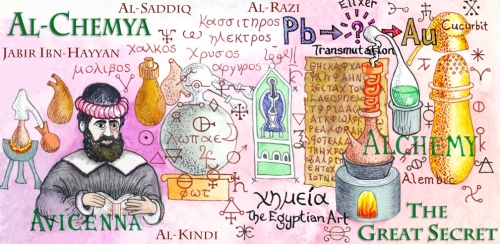A big part of the development of Alchemy originated in Islam. The word alchemy came from the Arabic word al-kimia, which came from the Persian word kimia. Will Durrant quotes in his book The Story of Civilization IV: The Age of Faith,
“Chemistry as a science was almost created by the Moslems; for in this field, where the Greeks (so far as we know) were confined to industrial experience and vague hypothesis, the Saracens introduced precise observation, controlled experiment, and careful records. They invented and named the alembic (al-anbiq), chemically analyzed innumerable substances, composed lapidaries, distinguished alkalis and acids, investigated their affinities, studied and manufactured hundreds of drugs. Alchemy, which the Moslems inherited from Egypt, contributed to chemistry by a thousand incidental discoveries, and by its method, which was the most scientific of all medieval operations.”
There are many Islamic figures in chemistry, and they often aren’t as acknowledged as they should be. Early Islamic chemists such as Jabir ibn Hayyan, Al-Kindi and Al-Razi made important chemical breakthroughs such as perfumery; distillation apparatus; muriatic, nitric, acetic and sulfuric acids; purified distilled alcohol, soda and potash; and filtration.
Jabir understood the importance of experimentation. Jabir created the alembic when he discovered how to complete the process of distillation. Jabir’s teacher, Ja’far al-Sadiq, refuted Aristotle’s theory of four elements by saying “I wonder how a man like Aristotle could say that in the world there are only four elements – Earth, Water, Fire, and Air. The Earth is not an element. It contains many elements. Each metal, which is in the earth, is an element.”
Another influential Muslim chemist was al-Razi. Al-Razi was the first to distill petroleum, invent kerosene and lamps for it, invent soap bars and recipes for soap, make antiseptics, and developed many chemical processes like sublimation.
In addition to all other contributions, Muslim alchemists developed theories on the possibility of the transmutation of metals, the philosopher’s stone, and creating artificial life in laboratories, as in later medieval European alchemy, though these theories were eventually discredited and rejected by practical Muslim chemists from the 9th century thereon. Therefore, medieval Arabic alchemy was the biggest contributor to Alchemy and Chemistry as we know it today.
sumber dari: http://elementsunearthed.com/tag/ibn-hayyan/

No comments:
Post a Comment